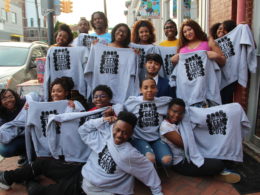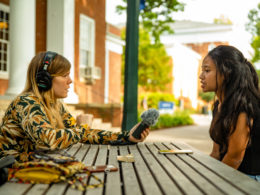Substance use disorder, or SUD, has had a lot of attention in the last few years as the opioid epidemic has reached a fever pitch, and the pandemic has made recovery even more difficult for those suffering.
In times like this, organizations like SAARA are especially critical to the people they serve.
SAARA is a statewide nonprofit that supports people and their loved ones with Substance Use Disorder, guiding them through healing and recovery. But SAARA is not soley focused on treatment. Workforce development and advocacy trainings are also a big part of what SAARA does throughout the year.
“Community outreach is in our DNA,” said Victor McKenzie Jr., executive director of Substance Abuse and Recovery Alliance of Virginia, when we caught up with him to learn more about the organization, its mission and how it serves the community.
McKenzie joined SAARA last June after noticing a high number of people struggling with substance use disorder at his last job. He is now on the front lines coordinating a comprehensive response to the issues around substance abuse.
What is SAARA’s core mission?
Our mission is to transform Virginia communities through whole education and advocacy for addiction prevention, treatment and recovery. We are a recovery-focused advocacy organization, and we work with individuals and families addicted by substance use, and we really push for a better system of care.
What don’t most people realize or understand?

I think there’s a stigma behind it, and there’s layers to it. For a lot of people, it is looked at as a moral failing: you got to stop, put down the bottle or it’s your fault as if you have control over it, versus looking at substance use disorder as a disease, as a chronic illness, the same way someone who suffers from diabetes.
Growing up, my grandmother did have diabetes, and every week we would go down to the pharmacist to get her prescription for insulin. She was always very intentional about checking her blood pressure, making sure she took her shots, but it took that level of intentionality because it is something chronic that you are continually dealing with. There is no “answer” for addiction other than recovery.
During the most recent legislative session, which bills were a top priority for SAARA and why?
Each year, in conjunction with the board, staff, community members and people we serve, we focus on what the community is telling us its priorities are. This year we had six: recovery support, treatments and services, incorporation of harm reduction principles and techniques, employment, education, housing and social justice reform. As bills come out and fall in those buckets, we take the approach of, “All right, is this something that benefits our community? Is it something that provides a barrier to our community?” Based on that, we will provide a level of support.
One bill that we were working hard at was HB 2300. The patron was Del. Karrie Delaney. That was a bill that pretty much removed barriers put on patients to obtain Naloxone for opiate-related overdoses by requiring hospitals to provide take-home Naloxone to those patients upon discharge.
Now, it’s called Danny’s law. It was a bill that was passed last year that we also advocated for. Our goal was to go back and strengthen the language. We believe hospitals have the ability to provide that lifesaving Narcan or naloxone kits. If someone comes in, and it’s a substance use-related incident, by providing that kit, you are essentially helping save lives. That’s something we wanted to push, which was a part of our harm-reduction priority.
What are SAARA’s goals moving forward now that the General Assembly is over?
The first thing is making sure we’re communicating what has passed and how it affects your everyday life to anybody involved with several different communities, recovery communities, stuff like that. That’s part of our debrief.
The second part is that we are launching a campaign called Voices for Recovery, and the goal of that campaign is to humanize the disease of addiction. From SAARA’s point of view, what we’ll do is we’ll train peers, and their supporters – family members, friends – and talk to them about their story and add that human element to it. The goal is to do a lot of community outreach about that. We’re going to do some panels, discussions, things along those lines.
What made you want to become involved with SARAA?
Growing up in New York City, I grew up in public housing, and so a lot of aftermath on the war on drugs and how that affected my community. But prior to this, I’ve worked with nonprofits. I worked for the Neighborhood Resource Center here in Richmond, where I led economic mobility programs as program director. It was a community that was really affected by drug use and other things.
But the real-life core of it is that a couple years ago, we were working through these economic programs, and we realized that there were underlying barriers that people were having. Those hierarchy of needs, if you don’t know where you’re going to sleep, you don’t care about your credit score. You don’t care about these things, but in addition to that, we also noticed that mental health was big and so we actually took on a case manager to help us work through it. As we were working through it, all of these underlying areas needed to be addressed before they could even be ready for these programs.
Part of that was substance use disorder, but it wasn’t as widely available as mental health. We talk about mental health now a lot differently than we did 20 years ago. It’s open. It’s part of everyday conversation. We want to get substance use disorder to that point because those resources aren’t readily available since that stigma is still there. So that’s why I’m here. I wanted to be a part of that.
To learn more about SAARA, visit its website, or follow it on Facebook, Twitter and Instagram. You can also donate directly to the organization here.










